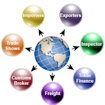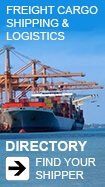This is part 11 in a series of 12 step-by-step guide to help you succeed in today's global export market.OPERATING ABROADOperating AbroadThis module is aimed primarily at companies which will establish themselves in the market through a permanent presence such as a branch office or a formal partnership, but it will also be of interest to companies and individuals working on site for extended periods.
The International Business EnvironmentBy way of a general overview, it is worth noting that the concept of a legal framework within which business relationships are managed in a predictable manner, and which is applied impartially to all, is well accepted in the business, legal and political environment in Western Europe, North America, Australia, New Zealand and most of Latin America. The extreme importance of treating well-known partners and colleagues with respect is well established in many of the industrialized economies of Asia and the Middle East. In many other areas of the world, decisions that appear arbitrary to outsiders are a normal fact of business life and there is no obligation to explain, particularly not to foreigners. In all cases, the quality of the relationship between the firm and its business colleagues, and its ability to blend smoothly into the operating environment - business, political, social and cultural - will be far more important than its legal status to its long-term success.
Trade Agreements and OrganizationsInternational trade agreements such as the North American Free Trade Agreement (NAFTA), the General Agreement on Trade in Services (GATS), and cooperation fora such as Asia Pacific Economic Cooperation (APEC), have greatly reduced the number of overt barriers to market access for services. However, both overt and covert barriers do exist in most markets. Understanding the implications of such barriers in your target market is essential to your operations abroad. In general, markets in which information is readily available about barriers are subject to fewer hidden barriers. These are the markets to which you are most likely to be able to export directly. Those in which information is not as readily available, and in which the business culture is significantly different from your own will be the most difficult to enter directly and in which a strong local partner is essential. In many cases, overcoming barriers is primarily a question of understanding and following regulations conscientiously. Every jurisdiction sets standards and regulations for establishment of business and provision of services. These are most explicit and detailed when the service is to berendered to the general public, particularly in areas such as health care, safety, education or to clients involved in national security, even if the service itself is non-military.
Legal IssuesTo ensure compliance with legal requirements and cultural expectations, you need to:
b) have the legislation "interpreted" to you by legal advisors in the market as well as by a trade law specialist; c) work with a local partner who has succeeded in the market; and, d) go beyond the issues of establishment to clarify issues such as labour law, liability insurance, repatriation of profits and capital.
Understanding Foreign Business EnvironmentsFamiliarize yourself as much as possible with the local environment that you will operate in. Your sources of information can range from reading newspapers, trade sites and websites of companies already established, to walking in the target market to observe common characteristics, to identify areas in which your business will be able to excel and to gather "best practices" information. In all services it is important to understand the full range of services, the "professional boundaries" normally associated with any type of service. In some countries a taxi service that did not train its drivers to know every detail of every street would not be competitive. In others, it is essential for the driver always to lift luggage in and out of the trunk or luggage area beside the driver, and to open and close the passenger doors, and help the passenger in and out of the cab, and carry the luggage into the hotel. In Finland, taxi drivers seem eager to use their car phones to check addresses, make appointments, even change airline bookings, and make restaurant reservations. Understanding the parameters of service expectations is important in:
Overcoming obstaclesThe main challenges in terms of legal right to provide services are: a) overcoming inertia; b)handling conflicting requirements between government departments; and c) unexplained delays. a) Overcoming Inertia
b) Conflicting Requirements
c) Unexplained Delays
Governing LawOnce you are established in a country, you are subject to the laws of that country, so be aware of the "Governing Law" of each contract.
Intellectual property
Intellectual property is a collective term used to refer to new ideas, inventions, designs, writings, films, etc. and protected by copyright, patents, trademarks, etc. There are many laws protecting intellectual property and which should be carefully studied before the exporting of services such as ideas, designs, technology, trade secrets or know-how. An important element of conducting in-depth market research, is to understand the rules, regulations and laws governing intellectual property. Patent and intellectual property law is complex. If you think you need this kind of protection or want to make sure your product complies with foreign patent laws, you should consider retaining professional legal counsel.
a. Intellectual Property Laws
b. General Information/Other LinksPersonnel Issues
Potential Barriers to EntryOvert restrictions include:
b) set-asides where contracts are accessible only to companies of a particular size or representing a specific segment of society; and c) contracts in certain market segments, such as military intelligence, considered too sensitive for foreign intervention.
Dealing with Personnel IssuesThe best practice is to try to avoid personnel issues by preparing properly, prior to commencing operations abroad, by:
b) partnering with companies eligible under such things as set-aside provisions. It is important for exporters to understand the extent and implications of legitimate barriers they may encounter in each market. It is equally important for exporters to understand the requirements for visas for all personnel who may work in any market. Information about visa requirements and accreditation issues are available for all markets covered by trade agreements. Gaining the right local advice is a key factor in handling personnel issues. You may wish to "try out" a number of local advisors without making any long term commitments. One possibility is to invite several individuals, preferably recommended by different sources, to form an "Advisory Committee" in your exporting efforts. You could then invite the members with whom you work most comfortably and effectively, and others you may have subsequently met, to form and "Advisory Committee for Market Entry". Members of such Advisory Committees may become core individuals in your long term operations, as managers, partners or directors.
Living AbroadLiving and working in a foreign country can be a complete delight or a nightmare depending on the individual, the country and the expectations. Preparation ahead of time is critical in ensuring that the experience will be a positive one. The following are some examples of what you can do to prepare for living abroad:
b) select someone who has already lived and travelled extensively in the target country or region to find out about their business and personal experiences and to seek their advice; c) provide adequate language and cultural training, and a short acclimatization visit for the whole family, if appropriate; d) ensure that the accompanying family members are enthusiastic but realistic about the assignment; e) learn in advance as much as possible, about the cycle of enthusiasm, disappointment, frustration, acceptance and enjoyment that many people experience in foreign postings; f) recognize that some people cannot function efficiently in unfamiliar surroundings; and g) obtain comprehensive briefing on health, security and education (especially if school age children will be moving)
Cross Border Movement of PersonnelWhether you need information on entering a market on a temporary basis to attend a business meeting, a trade show or are intending to relocate for an extended period of time, it is important to consider the rules and regulations of the target country. For information about Canadian, U.S. or Mexican immigration regulations, contact the relevant embassy, consulate or immigration office nearest you. Your country's Trade Commissioner Service can also assist by providing visit information and advice on market access problems. Check Import and Export Information section or visit Embassies and Consulate, to locate the Trade Commissioner for your target market. To promote trade in goods and services, Chapter 16 of the North American Free Trade Agreement (NAFTA) facilitates the cross-border movement of business persons who are citizens of member countries to the NAFTA. The provisions within Chapter 16 complement rather than replace a country's existing provisions for temporary entry. In addition, the NAFTA does not alter a member country's general immigration provisions governing public health, safety and national security. NAFTA guidelines cover the following categories of business persons: Business Visitors, Professionals, Intra-Company Transferees, Traders and Investors, and accompanying Spouses and Dependants. There is also information on non-NAFTA U.S. temporary-entry Visas for persons working in specialty occupations, performing artists and labourers.
a. General Information/Other Links (North America)
TaxationWhether you are merely completing a simple transaction, undertaking a complex project, or establishing an operation in the market, taxation issues must be thoroughly investigated prior to working in a foreign market. When seeking clarification, it is advisable to obtain opinions, in writing, from:
b) your local accountant; c) an expert in international work; and d) your client who, especially if this is a private sector operation, may be able to provide the most realistic advice. In particular, ascertain the timing of all taxation liabilities, the process and pace of drawbacks, as well as the process for challenging the tax regime.
Infrastructure IssuesThe challenges associated with providing services to and in a foreign market are complex and quite different from those encountered in exporting goods. The ability of service exporters to deliver in foreign markets, often depends on the:
b) existence of a reliable infrastructure of computers, faxes, modems, etc; c) frequency and convenience of regularly scheduled air links between your country and the market; and d) technological sophistication, receptivity and flexibility of customers. Service exporters need to be familiar with all of the above infrastructural issues as they directly impact upon their operation, particularly if they operate abroad for any length of time. |
- Source from manufacturers worldwide
- Find inspection, freight services and more
- Access global trade resources and guides
- Be part of largest global trade community and much more...
- Be where your customers are!
- Promote and market your services
- Receive direct quote requests
- Back office support, set up regional offices and much more...



